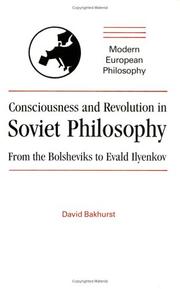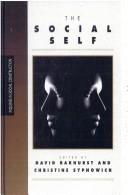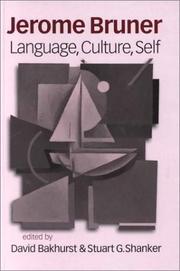| Listing 1 - 10 of 10 |
Sort by
|

ISBN: 0521407109 0521385342 0511608942 Year: 1991 Volume: vol *6 Publisher: Cambridge : Cambridge University Press,
Abstract | Keywords | Export | Availability | Bookmark
 Loading...
Loading...Choose an application
- Reference Manager
- EndNote
- RefWorks (Direct export to RefWorks)
This 1991 book is a critical study of the philosophical culture of the USSR, and the first substantial treatment of a Soviet philosopher's work by a Western author. The book identifies a tradition within Soviet Marxism that has produced significant theories of the nature of the self and human activity, of the origins of value and meaning, and of the relation of thought and language. The tradition is presented through the work of Evald Ilyenkov (1924-1979), the man who did most to rejuvenate Soviet philosophy after its suppression under Stalin. Professor Bakhurst sets Ilyenkov's contribution against the background of the bitter debates that divided Soviet philosophers in the 1920s, of Vygotsky's 'socio-historical psychology', of the controversies over Lenin's legacy, and of the philosophy of Stalinism. He traces Ilyenkov's tense relationship with the Soviet philosophical establishment and his passionate polemics with Soviet opponents. This book offers a unique insight into the world of Soviet philosophy, the place of politics within it, and its prospects in the age of glasnost and perestroika.
Bewustzijn --- Cogito --- Conscience (Psychophysiologie et philosophie) --- Consciousness --- Filosofie [Marxistische ] --- Marxian philosophy --- Marxism --- Marxisme --- Marxist philosophy --- Marxistische filosofie --- Philosophie marxiste --- Philosophy [Marxist ] --- Philosophy, Marxist --- Philosophy, Russian --- Revolutions --- Conscience --- Philosophie russe --- Révolutions --- Philosophy --- Philosophie --- Il'enkov, Eval'd Vasil'evich --- Il'enkov, Èvald'd Vasil'evic --- -Revolutions --- -Insurrections --- Rebellions --- Revolts --- Revolutionary wars --- History --- Political science --- Political violence --- War --- Government, Resistance to --- Russian philosophy --- Apperception --- Mind and body --- Perception --- Psychology --- Spirit --- Self --- Communism and philosophy --- -Philosophy --- Révolutions --- Ilʺenkov, Ėvalʺd Vasilʺevich --- Ilʺenkov, Èvald'd Vasil'evič --- Philosophy [Russian ] --- 20th century --- Il enkov, Eval d Vasil evich. --- Philosophy, Marxist. --- Philosophy, Russian - 20th century. --- Consciousness. --- Revolutions - Philosophy. --- Ilʹenkov, Ėvalʹd Vasilʹevich. --- Ильенков, Э. В. --- Ilʹenkov, Ėvalʹd Vasilʹevich --- Ilyenkov, E. V. --- Ilyenkov, Evald --- Arts and Humanities --- Philosophy.
Book
ISBN: 9781444339093 Year: 2011 Publisher: Chichester Wiley-Blackwell
Abstract | Keywords | Export | Availability | Bookmark
 Loading...
Loading...Choose an application
- Reference Manager
- EndNote
- RefWorks (Direct export to RefWorks)
"In The Formation of Reason, David Bakhurst expounds and defends a socio-historical account of the human mind. Inspired by the work of the influential philosopher John McDowell, Bakhurst maintains that the distinctive character of human psychological powers resides in our responsiveness to reasons, a capacity that develops in children as they are initiated into traditions of thinking and reasoning. In this process of formation (or Bildung), children enter 'the space of reasons' to become rational agents in self-conscious control of their thoughts and actions. In addition to exploring McDowell's ideas, Bakhurst draws on a variety of thinkers - including Davidson, Hacking, Ilyenkov, Strawson, Vygotsky, Wiggins, and Wittgenstein - to illuminate questions of personhood, identity, learning, rationality, and freedom. Offering an intellectually stimulating exploration of the conceptual foundations of the philosophy of education, The Formation of Reason breathes fresh life into a familiar but controversial idea: that the end of education is the cultivation of autonomy"--
Knowledge, Theory of --- Philosophy of mind --- Reason --- McDowell, John Henry.
Book
ISBN: 9004544259 Year: 2023 Publisher: Leiden, The Netherlands : Koninklijke Brill nv,
Abstract | Keywords | Export | Availability | Bookmark
 Loading...
Loading...Choose an application
- Reference Manager
- EndNote
- RefWorks (Direct export to RefWorks)
"The Heart of the Matter explores the legacies of Ilyenkov and Vygotsky, two Russian thinkers who marshalled their passion for truth, enlightenment and independent thought to understand the human mind, not just for the sake of knowledge alone, but to help create the conditions in which human flourishing can become a reality for all. The book renders their theories intelligible against the dramatic social and historical background in which they lived and worked, bringing their ideas into dialogue with themes and thinkers in Western philosophy to reveal how they illuminate philosophical issues of enduring significance"--
Philosophy, Russian --- Philosophy, Marxist. --- Psychology --- Ilʹenkov, Ė. V. --- Vygotskiĭ, L. S.
Book
ISBN: 9780511608940 9780521385343 9780521407106 Year: 1991 Publisher: Cambridge Cambridge University Press
Abstract | Keywords | Export | Availability | Bookmark
 Loading...
Loading...Choose an application
- Reference Manager
- EndNote
- RefWorks (Direct export to RefWorks)

ISBN: 080397597X 9780803975972 Year: 1995 Publisher: London Sage
Abstract | Keywords | Export | Availability | Bookmark
 Loading...
Loading...Choose an application
- Reference Manager
- EndNote
- RefWorks (Direct export to RefWorks)
Social psychology. --- Self. --- Self --- Social psychology --- Mass psychology --- Psychology, Social --- Human ecology --- Psychology --- Social groups --- Sociology --- Personal identity --- Consciousness --- Individuality --- Mind and body --- Personality --- Thought and thinking --- Will

ISBN: 0761955313 1446217639 9786612020483 0761955321 128202048X 1849202109 9781849202107 9781446217634 9781282020481 9780761955313 9780761955320 6612020482 Year: 2001 Publisher: London Thousand Oaks, Calif. SAGE Publications
Abstract | Keywords | Export | Availability | Bookmark
 Loading...
Loading...Choose an application
- Reference Manager
- EndNote
- RefWorks (Direct export to RefWorks)
Such is the breadth of his vision that Bruner's work has inspired thinkers in many of the major areas of psychology and has had a powerful impact on adjacent disciplines. His writings on language acquisition, culture and education are of profound and enduring importance. Focusing on the dominant themes of language, culture and self, this volume provides a comprehensive exploration of Bruner's fertile ideas and a considered appraisal of his legacy.
Psycholinguistics. --- Education. --- Psychology --- Children --- Education, Primitive --- Education of children --- Human resource development --- Instruction --- Pedagogy --- Schooling --- Students --- Youth --- Civilization --- Learning and scholarship --- Mental discipline --- Schools --- Teaching --- Training --- Language, Psychology of --- Language and languages --- Psychology of language --- Speech --- Linguistics --- Thought and thinking --- Philosophy. --- Education --- Psychological aspects --- Bruner, Jerome S. --- Bruner, Jerome --- Pu-lu-na --- Bruner, Jerome Seymour
Book
ISBN: 147428728X 147258435X 1472584341 9781472584359 9781472584342 9781474287289 9781472584335 1472584333 9781472584328 1472584325 Year: 2016 Publisher: New York : Bloomsbury Academic,
Abstract | Keywords | Export | Availability | Bookmark
 Loading...
Loading...Choose an application
- Reference Manager
- EndNote
- RefWorks (Direct export to RefWorks)
"Since Michael Oakeshott spoke of education as initiation into "the conversation of mankind" more than fifty years ago, the idea has inspired a diverse array of thinkers and continues to be invoked today by those seeking to resist the influence of managerialism and narrow instrumentalism in educational policy and practice. Education and Conversation draws together papers written by scholars from both the analytic and continental philosophical traditions to offer a variety of perspectives on the implications of Oakeshott's educational ideas. The metaphor of the conversation of mankind is explored, together with the roots of Oakeshott's thinking in his early philosophical work, the relevance of his ideas to the concept of Bildung, and the significance of his political conservatism in evaluating the seemingly progressive potential of his educational ideas. In addition, concepts prominent in Oakeshott's thought are taken up and brought to bear on contemporary philosophical discussions about education, learning and development, including the nature of initiation, the phenomenology of listening, and the value of the liberal arts tradition. Education and Conversation shows how the idea of conversation illuminates both the character and the ends of education, yielding insight into the scope and limits of the philosophy of education and the character of philosophical inquiry more generally"-- "Since Michael Oakeshott spoke of education as initiation into "the conversation of mankind" more than fifty years ago, the idea has inspired a diverse array of thinkers and continues to be invoked today by those seeking to resist the influence of managerialism and narrow instrumentalism in educational policy and practice. Education and Conversation draws together papers written by scholars from both the analytic and continental philosophical traditions to offer a variety of perspectives on the implications of Oakeshott's educational ideas. The metaphor of the conversation of mankind is explored, together with the roots of Oakeshott's thinking in his early philosophical work, the relevance of his ideas to the concept of Bildung, and the significance of his political conservatism in evaluating the seemingly progressive potential of his educational ideas. In addition, concepts prominent in Oakeshott's thought are taken up and brought to bear on contemporary philosophical discussions about education, learning and development, including the nature of initiation, the phenomenology of listening, and the value of the liberal arts tradition.Education and Conversation shows how the idea of conversation illuminates both the character and the ends of education, yielding insight into the scope and limits of the philosophy of education and the character of philosophical inquiry more generally."--
Education, Humanistic. --- Education, Liberal --- Humanistic education --- Liberal arts education --- Liberal education --- Education --- Classical education --- Oakeshott, Michael, --- Oakeshott, Michael Joseph, --- Criticism and interpretation.
Book
ISBN: 9780199604678 Year: 2014 Publisher: Oxford Oxford University Press
Abstract | Keywords | Export | Availability | Bookmark
 Loading...
Loading...Choose an application
- Reference Manager
- EndNote
- RefWorks (Direct export to RefWorks)
General ethics --- Dancy, Jonathan --- Ethics --- Deontology --- Ethics, Primitive --- Ethology --- Moral philosophy --- Morality --- Morals --- Philosophy, Moral --- Science, Moral --- Philosophy --- Values --- Philosophy.
Book
ISBN: 019166913X 9780191669132 1299661904 9781299661905 Year: 2013 Publisher: Oxford Oxford Scholarship Online
Abstract | Keywords | Export | Availability | Bookmark
 Loading...
Loading...Choose an application
- Reference Manager
- EndNote
- RefWorks (Direct export to RefWorks)
'Thinking about Reasons' collects fourteen new essays on ethics and the philosophy of action, inspired by the work of Jonathan Dancy - one of his generation's most influential moral philosophers. Many of the most prominent living thinkers in the area are contributors to this collection, which also contains an afterword by Dancy himself.
Ethics. --- Reason. --- Dancy, Jonathan.
Periodical
ISSN: 14679752 03098249
Abstract | Keywords | Export | Availability | Bookmark
 Loading...
Loading...Choose an application
- Reference Manager
- EndNote
- RefWorks (Direct export to RefWorks)
'Journal of Philosophy of Education' publishes articles representing a wide variety of philosophical traditions. They vary from examination of fundamental philosophical issues in their connection with education, to detailed critical engagement with current educational practice or policy from a philosophical point of view. The journal aims to promote rigorous thinking on educational matters and to identify and criticise the ideological forces shaping education. Ethical, political, aesthetic and epistemological dimensions of educational theory are amongst those covered.
Education --- Philosophy --- Philosophie de l'éducation. --- Pedagogiek. --- Éducation --- Philosophy. --- Philosophie --- Great Britain. --- Children --- Education, Primitive --- Education of children --- Human resource development --- Instruction --- Pedagogy --- Schooling --- Students --- Youth --- Anglia --- Angliyah --- Briṭanyah --- Grande-Bretagne --- Grossbritannien --- Marea Britanie --- Nagy-Britannia --- Prydain Fawr --- Royaume-Uni --- Saharātchaʻānāčhak --- Storbritannien --- United Kingdom --- United Kingdom of Great Britain and Ireland --- United Kingdom of Great Britain and Northern Ireland --- Velikobritanii︠a︡ --- Wielka Brytania --- Civilization --- Learning and scholarship --- Mental discipline --- Schools --- Teaching --- Training --- Northern Ireland --- Scotland --- Wales --- Great Britain --- England and Wales --- Velikobritanii͡ --- Förenade kungariket --- Grã-Bretanha --- Igirisu --- Iso-Britannia --- Yhdistynyt kuningaskunta --- Education.
| Listing 1 - 10 of 10 |
Sort by
|

 Search
Search Feedback
Feedback About UniCat
About UniCat  Help
Help News
News